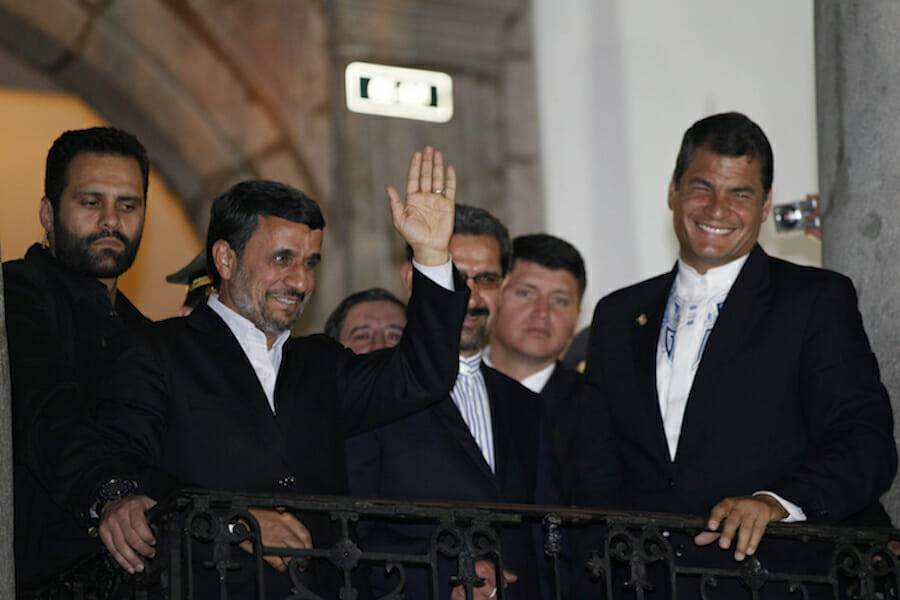
Iran v. the United States: Should Latin America be Concerned?
Since the death of Iranian General Qassem Soleimani on January 3rd as a result of an airstrike at the Baghdad International Airport, Iraq, there has been great consternation about how (and when) will Iran retaliate.
Apart from the recent attack against U.S. military facilities in Iraq, it is widely assumed that Tehran’s future actions move will take place in a geographically neighboring area (namely the Middle East and North Africa) against other American interests. However, there is a certain part of the world where there is an Iranian presence that should not be overlooked in determining where the counterstrike will take place.
History and Friends
The region in question is Latin America. Before one goes off on a tangent regarding whether or not if such a move is indeed feasible, there are two key aspects that we should remind ourselves of: history and politics.
First, there are already precedents for such an operation, namely the attacks carried out by Hezbollah in Argentina against the Israeli Embassy back in 1992, and the Jewish Community Center (Asociación Mutual Israelita Argentina: AMIA) in 1994. Over a hundred people were killed. “Both Iran and Hezbollah have denied any involvement. No-one has ever been brought to trial in connection with the bombing,” explains the BBC.
As a result of these attacks, the now-former Mauricio Macri administration designated Hezbollah as a FTO (Foreign Terrorist Organization) on July 18th, 2019. This date is not random, as it marked the 25th anniversary of the attack against the cultural center.
However, a change in government to the left after the most recent presidential elections (President Alberto Fernandez’s vice president is also former President Cristina Fernandez de Kirchner) may be a reason to scrutinize the actions of Argentina more closely now. The new administration in Buenos Aires already irked Washington by inviting Venezuelan officials, loyal to de facto President Nicolas Maduro, for the presidential inauguration ceremony, hence it will be important to monitor if the new Argentine government approaches other controversial governments, like Tehran.
The second aspect to keep in mind is political. Of all the nations in Latin America the best relationship that Iran currently has overall has to be the relationship with Venezuela (under the Maduro regime, obviously). Both nations have what has to be considered to be hostile relations with the United States. Despite its economic woes, Iran has been one of the powers that has been providing an economic, technical and diplomatic lifeline to Caracas. Of particular interest to Tehran are Venezuela’s gold mines. But there is a diplomatic reason to be wary of this particular relationship. After the strike against Soleimani, the Venezuelan government issued a press release in which it expressed its condolences and solidarity to the people of Iran and Iraq, and also condemned the U.S. airstrike.
There are two other nations that Iran could reach out to as well for support: Cuba and Nicaragua. Both have tense relations with Washington. The Trump administration reimposed the sanctions program that the Obama administration began to roll back. The Cuban economy has been negatively impacted by this and seeks relief. Anecdotally, Cuba and Iran celebrated 40 years of diplomatic relations in late 2019. Meanwhile, President Ortega of Nicaragua has long been a thorn in the side of the United States and has been critiqued after more than 300 people were killed as part of major anti-Ortega protests in Nicaragua in 2018.
On the other hand, Iran recently lost a key ally in Evo Morales. The two nations had a close relationship before his ouster in 2019. This could have a negative impact on any future plans by Iran.
So what could Iran do?
A major concern currently among analysts are reports that the IRGC (Islamic Republic Guard Corps) has a presence in Venezuela. The quantity of Iranian personnel may very well be exaggerated – lack of reliable information hinders a serious analysis — but even a small amount of security and defense personnel is problematic; if these allegations are confirmed, it would give Iran a springboard to launch operations against U.S. interests in South America.
Another potential avenue that could be open to Tehran is to send funds to the region. There has been pressure placed on several countries in South America, specifically Paraguay, to strengthen their money laundering legislation. Considering the past relations between these two states this is an issue that should not be ignored. Anecdotally, the Paraguayan government has recently stated that it will reinforce security in strategic locations, no doubt as a precaution over the presence of Hezbollah affiliates in the region.
Although it should be regarded as a stretch, there is a genuine risk that Iran does have the ability to strike against U.S. interests and partners in this hemisphere.
Already, Latin American media has published various articles about how U.S.-allies in Latin America could be the targets of potential Iranian retaliation. Reports in El Tiempo Latino and Dirario Las Americas have already discussed these scenarios, while Estrategia y Negocios has stated that the Iran-Nicaragua relationship puts Managua in a problematic situation nowadays.
At a time of great uncertainty, rumors abound, and Latin America should be watchful that it does not, once again, become the battlefield of extra-regional states.
The views expressed in this article are those of the authors alone and do not necessarily reflect those of any institutions with which the authors are associated.

